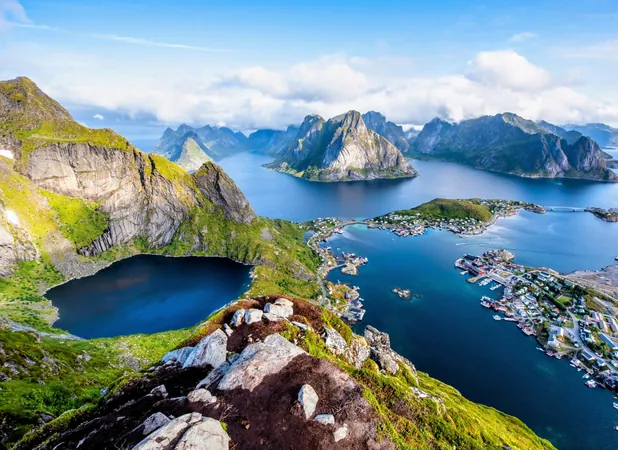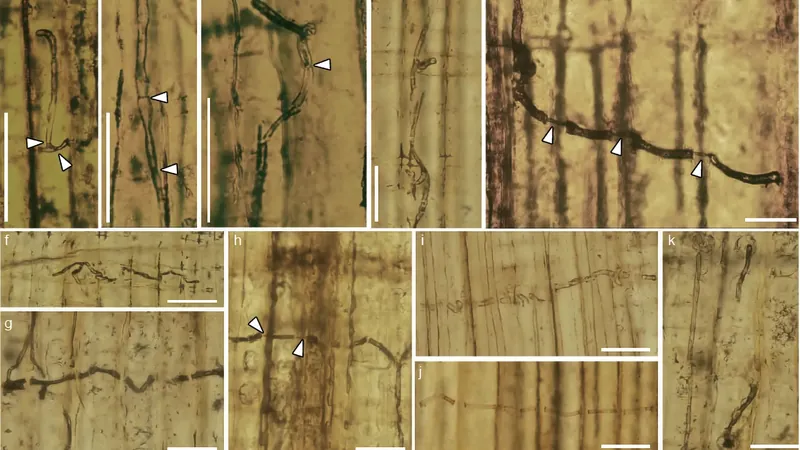
Arctic Fjords in Peril: A Wake-Up Call from the North
2025-04-27
Author: Emma
The Arctic’s Crucial Role in Climate Regulation
The breathtaking icy landscapes of the Arctic do far more than dazzle with their beauty; they are essential for regulating our planet's climate. However, recent studies reveal alarming signs that climate change is threatening one of this region’s most vital defenses—the ability of its fjords to capture and store carbon.
Kongsfjorden: A Case Study in Change
Researchers from the iC3 Polar Research Hub are zeroing in on Kongsfjorden in Svalbard, a key ecosystem in the Arctic. Their findings indicate that the melting ice is having profound effects, not just locally but on the delicate balance of life that crucially helps siphon carbon dioxide from the atmosphere.
Meet the Microcosmic Heroes: Phytoplankton
Phytoplankton, the oceans’ tiny powerhouses, are the backbone of the Arctic food web. These microscopic plants don’t just feed fish—they also play a pivotal role in cycling carbon and battling climate change. As ice retreats, sunlight penetrates deeper into the ocean, igniting phytoplankton blooms that attract fish and other marine creatures.
A Double-Edged Sword: Rising Ocean Temperatures
While warmer waters initially seem beneficial for phytoplankton growth during the bright Arctic summer, this growth comes with serious complications. Warmer surface waters become stable and stratified, preventing essential nutrients from reaching the phytoplankton that reside at the ocean's surface. Ironically, while we may see more blooms, their long-term effectiveness in capturing carbon could dwindle.
Nutrient Lifelines in Jeopardy
Glacial meltwater is a lifeline, delivering essential nutrients to Arctic fjords that sustain marine life. However, as glaciers melt at an alarming rate, this vital nutrient flow is becoming erratic. The result? A potential collapse of the rich ecosystems these fjords support, impacting not only fish and marine mammals but also diminishing the Arctic's ability to act as an effective carbon sink.
The Arctic’s Message to the World
The Arctic is a global climate bellwether; what unfolds here often foreshadows challenges that will ripple across the planet. The shrinking ice caps symbolize more than loss; they serve as a stark warning about our changing climate.
"The future of Arctic fjords reflects the broader climate challenges we face globally," warns lead study author Jochen Knies.
Climate Change Transcends Borders
The impact of climate change isn't confined to the Arctic; it's reshaping weather patterns, ecosystems, and livelihoods worldwide. Rising temperatures lead to fiercer storms, prolonged droughts, and volatile agricultural seasons. Animals are shifting their ranges, and industries from agriculture to tourism must adapt to this new reality.
What is happening in the Arctic fjords is part of a much larger narrative. The melting of distant glaciers threatens coastal cities thousands of miles away through rising sea levels. Changes in phytoplankton blooms may seem minute, but they indicate broader disruptions within our planet's natural systems with far-reaching global effects.
Accelerating Changes Demand Immediate Action
Scientists stress that these transformations are occurring more rapidly than previously understood, with every degree of warming carrying significant consequences. Each decision—be it reducing emissions or safeguarding natural reserves—holds the potential to steer us toward a more sustainable future.
The story of Arctic fjords is not just localized; it’s a vital chapter in humanity’s collective challenge against climate change.
Stay Informed
For those interested in more riveting content about our planet, consider subscribing to our newsletter for exclusive articles and updates.









 Brasil (PT)
Brasil (PT)
 Canada (EN)
Canada (EN)
 Chile (ES)
Chile (ES)
 Česko (CS)
Česko (CS)
 대한민국 (KO)
대한민국 (KO)
 España (ES)
España (ES)
 France (FR)
France (FR)
 Hong Kong (EN)
Hong Kong (EN)
 Italia (IT)
Italia (IT)
 日本 (JA)
日本 (JA)
 Magyarország (HU)
Magyarország (HU)
 Norge (NO)
Norge (NO)
 Polska (PL)
Polska (PL)
 Schweiz (DE)
Schweiz (DE)
 Singapore (EN)
Singapore (EN)
 Sverige (SV)
Sverige (SV)
 Suomi (FI)
Suomi (FI)
 Türkiye (TR)
Türkiye (TR)
 الإمارات العربية المتحدة (AR)
الإمارات العربية المتحدة (AR)